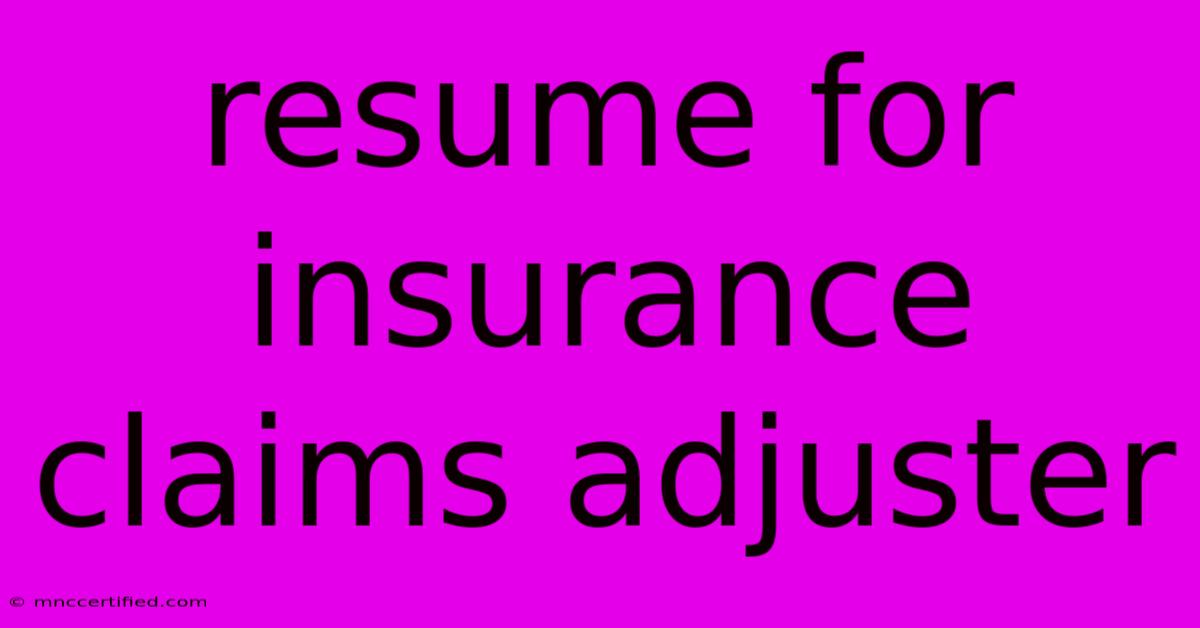Resume For Insurance Claims Adjuster

Table of Contents
Crafting a Winning Resume for Insurance Claims Adjusters: A Comprehensive Guide
Landing a job as an insurance claims adjuster requires a strong resume that showcases your skills and experience in a compelling way. This guide will provide you with a comprehensive framework and tips for crafting a resume that stands out from the competition and lands you that coveted interview.
Tailoring Your Resume for Success
Understanding the Role: Before you begin, take time to understand the specific requirements of the insurance claims adjuster role you are targeting. Research the company's website, job postings, and industry trends to identify key skills and qualifications. This will help you tailor your resume to align with the employer's specific needs.
Keywords are Key: Employers use Applicant Tracking Systems (ATS) to scan resumes for relevant keywords. Incorporate keywords related to insurance, claims adjusting, investigation, negotiation, customer service, and other relevant skills.
Sections to Include in Your Resume
1. Header:
- Contact Information: Include your full name, phone number, email address, and professional LinkedIn profile URL.
- Professional Summary: Write a concise and compelling summary highlighting your key skills and experience relevant to the role. Use action verbs and quantify your achievements whenever possible. Example: "Highly motivated claims adjuster with 5 years of experience in handling property and liability claims, consistently exceeding customer satisfaction expectations."
2. Experience:
- Reverse Chronological Order: List your previous job experiences starting with your most recent role.
- Quantify Your Achievements: Use specific numbers and data to demonstrate your impact. For example, "Successfully resolved 100% of assigned claims within the company's service level agreement."
- Highlight Relevant Skills: Emphasize skills like claim investigation, damage assessment, negotiation, customer service, and communication.
3. Education:
- Degree and Institution: List your highest level of education, including the name of the institution and your degree.
- Relevant Courses: If applicable, mention courses related to insurance, claims adjusting, or related fields.
4. Skills:
- Hard Skills: Include technical skills like software proficiency (e.g., Xactimate, AdjusterPro), legal knowledge, and specific insurance policies.
- Soft Skills: Emphasize essential soft skills like communication, negotiation, problem-solving, time management, and customer service.
5. Licenses & Certifications:
- Professional Licenses: List any relevant licenses, such as a state-issued insurance adjuster license.
- Certifications: Mention any professional certifications you possess, such as the Associate in Claims (AIC) designation.
6. Awards & Recognition:
- Accolades: Include any awards, recognition, or achievements relevant to the insurance industry.
Essential Tips for a Winning Resume:
- Keep it Concise: Aim for a one-page resume.
- Use Action Verbs: Start each bullet point with strong action verbs, like "managed," "negotiated," "analyzed," "evaluated," etc.
- Proofread Carefully: Ensure your resume is free of typos and grammatical errors.
- Customize for Each Job: Tailor your resume to each specific job posting, highlighting the most relevant skills and experiences.
- Use a Professional Format: Choose a clean and professional resume template.
Off-Page SEO for Your Resume:
- LinkedIn Profile: Optimize your LinkedIn profile with relevant keywords and a compelling summary.
- Online Portfolio: Create an online portfolio showcasing relevant projects, case studies, or testimonials.
- Networking: Attend industry events, connect with professionals on LinkedIn, and network with individuals working in the field.
By following these tips and tailoring your resume to each job application, you can increase your chances of landing an interview and securing your dream role as an insurance claims adjuster. Remember, your resume is your first impression; make it count!

Thank you for visiting our website wich cover about Resume For Insurance Claims Adjuster. We hope the information provided has been useful to you. Feel free to contact us if you have any questions or need further assistance. See you next time and dont miss to bookmark.
Featured Posts
-
Can I Cancel An Auto Insurance Claim
Nov 11, 2024
-
Barcelona Loses To Real Sociedad Lewandowski Offside Issue
Nov 11, 2024
-
Lamine Yamal Injury Update Latest News
Nov 11, 2024
-
Contractor Liability Insurance Texas
Nov 11, 2024
-
Saleme Insurance Services Altoona Pa
Nov 11, 2024